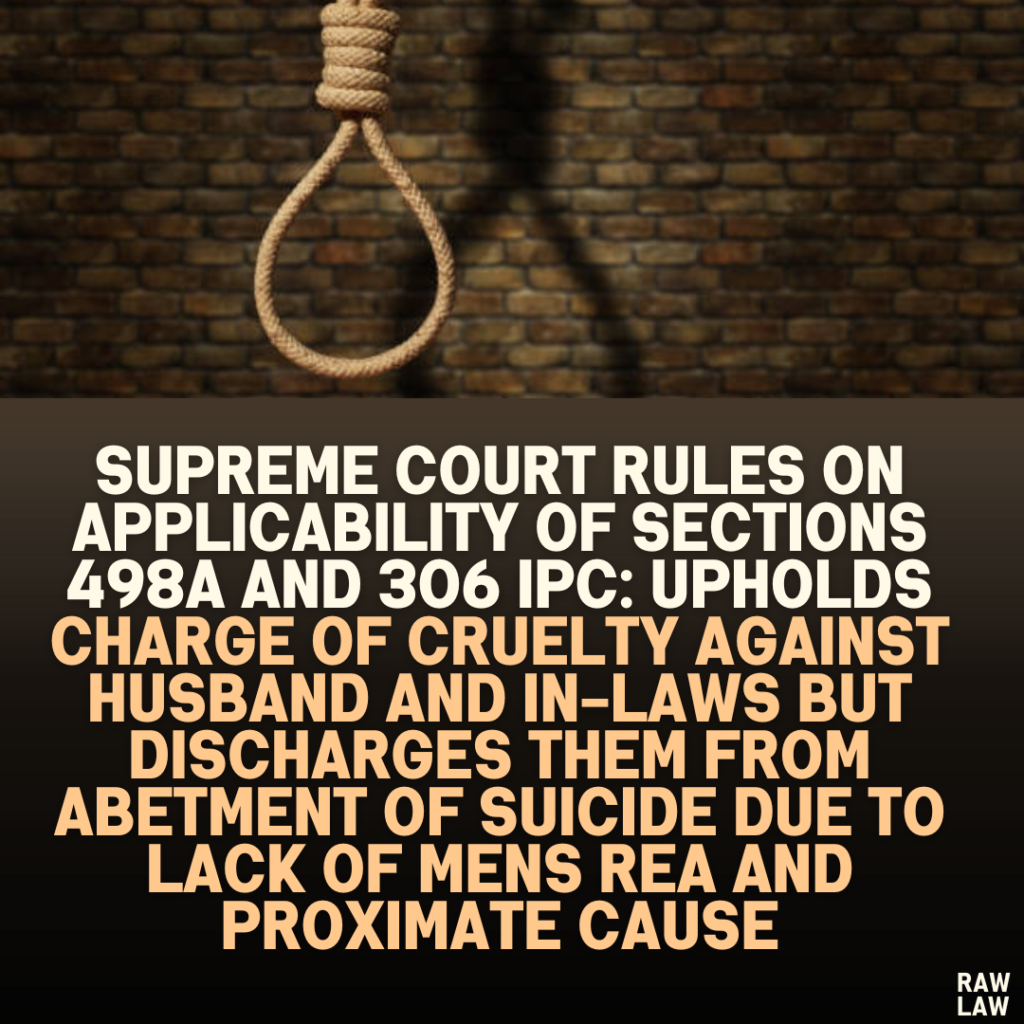Court’s Decision
The Supreme Court ruled on a criminal appeal arising from the Gujarat High Court’s decision. The Court upheld the charge under Section 498A IPC (punishment for cruelty against a woman), affirming that there was sufficient material for a prima facie case of harassment. However, the Court discharged the appellants under Section 306 IPC (abetment of suicide), concluding that there was no clear evidence of intentional acts that could have directly led to the suicide.
Facts
- The appeal was filed following the suicide of a woman, who had been married for 12 years. She had been living with her in-laws and her husband, one of the appellants, when the suicide occurred.
- The deceased’s father filed an FIR, alleging that the woman had been subjected to both physical and mental harassment by the appellants, including the sale of her streedhan (gold ornaments) a year prior to her death.
- The FIR suggested that this harassment had a direct role in compelling the woman to commit suicide by hanging herself in 2021.
- The appellants filed a petition seeking to quash the FIR and discharge the charges against them, claiming that the allegations were baseless and not supported by substantial evidence.
Issues
The case presented the following legal issues for determination:
- Whether there was a prima facie case under Section 498A IPC (cruelty) against the appellants.
- Whether there was a prima facie case under Section 306 IPC (abetment of suicide) against the appellants.
- Whether the appellants could be discharged from the charges under both provisions.
Petitioner’s Arguments
- Lack of Specific Evidence: The appellants argued that the allegations against them were vague and general. They contended that there was no clear evidence of continuous cruelty or harassment.
- No Direct Connection to Suicide: The appellants pointed out that the harassment, including the alleged selling of streedhan, occurred over a year before the woman’s death, which did not seem proximate enough to justify a claim of abetment of suicide.
- No Prior Complaints: The appellants argued that the deceased had never made any formal complaints of cruelty during the 12 years of her marriage, making the allegations seem fabricated.
Respondent’s Arguments
- Witness Statements: The prosecution relied on statements from the deceased’s father, other relatives, and witnesses who testified that the woman had experienced physical and mental abuse by the appellants.
- Intensified Harassment: It was argued that the harassment had intensified before the suicide, particularly around the time of a family event, leading to her tragic death.
- Psychological Impact: The respondent claimed that the ongoing cruelty, including the selling of the streedhan and the refusal to return it when demanded, had a significant psychological impact on the woman, which contributed to her decision to end her life.
Analysis of the Law
The Court considered the following legal provisions:
- Section 498A IPC: This provision punishes cruelty by a husband or his relatives, which can either lead to suicide or cause grave harm to the woman’s health. The Court examined whether the cruelty was intentional and whether it had caused significant harm.
- Section 306 IPC: This section deals with the abetment of suicide. For an individual to be convicted under this section, there must be clear evidence that their actions either instigated or aided the suicide. The Court reviewed the legal interpretation of “abetment” under Section 107 IPC, noting that it includes incitement, conspiracy, or aiding the act of suicide.
Precedent Analysis
The Court referenced several previous rulings to interpret the law:
- U. Suvetha v. State: The Court reiterated that cruelty under Section 498A must be deliberate and intended to cause significant harm or drive the woman to suicide.
- S.S. Chheena v. Vijay Kumar Mahajan: The Court highlighted that harassment, by itself, does not constitute abetment under Section 306 IPC without clear evidence of intent or direct action leading to the suicide.
- Ramesh Kumar v. State of Chhattisgarh: Defined “instigation” as acts that provoke or encourage the victim to commit suicide, emphasizing that it is not enough to show harassment; there must be direct involvement in inciting the suicide.
Court’s Reasoning
- Section 498A IPC: The Court found sufficient evidence of physical and mental cruelty. Statements from the deceased’s relatives indicated ongoing abuse, including the sale of her streedhan, and the demand for its return, which could be considered harassment. Even though no formal complaint had been made earlier, the evidence indicated cruelty that could have caused grave harm, making the charge under Section 498A prima facie valid.
- Section 306 IPC: The Court noted that while the deceased’s statements about harassment were credible, there was insufficient evidence linking the harassment directly to her suicide. The sale of streedhan and other forms of abuse occurred a year prior to the suicide, making it unlikely that they were immediate causes. The Court found that the required mens rea (intent) for abetment of suicide was not established, as there was no direct link between the accused’s actions and the suicide.
Conclusion
The Supreme Court ruled as follows:
- The appellants could not be discharged from the charge under Section 498A IPC, and the trial would proceed under that provision.
- However, the appellants were discharged from the charge under Section 306 IPC as the Court found no clear evidence of abetment or direct involvement in causing the suicide.
Implications
This judgment clarifies the standards required to prove abetment of suicide under Section 306 IPC, particularly emphasizing the necessity for direct involvement or clear instigation by the accused. It also reinforces that allegations of cruelty under Section 498A IPC must be considered carefully, as even without a formal complaint, ongoing abuse can constitute the necessary cruelty. Additionally, this case highlights the importance of mens rea in determining liability for abetment of suicide, requiring clear evidence of intentional acts that directly lead to the victim’s decision to take their own life.
